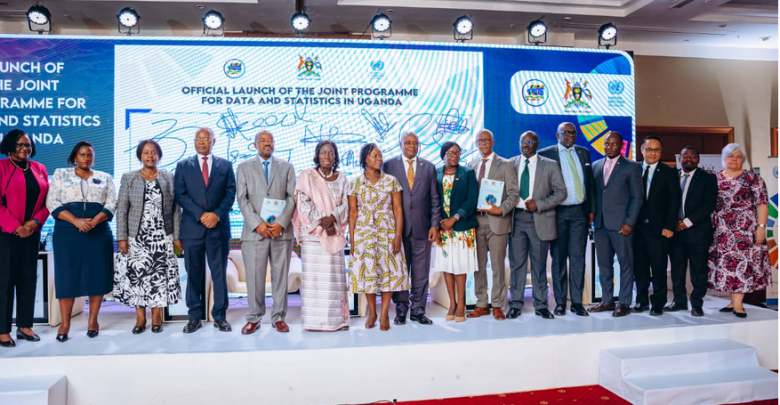In a momentous partnership between the Government of Uganda and twelve United Nations (UN) entities, a groundbreaking initiative has been unveiled heralding a new era in the country’s approach to data.
The Joint Programme for Data and Statistics (JPDS), spearheaded by the Uganda Bureau of Statistics (UBOS), represents a monumental investment of US$ 41,898,295, poised to revolutionize Uganda’s statistical landscape.
Spanning the duration of Uganda’s third National Development Plan (NDP III) and the UN Sustainable Development Cooperation Framework (UNSDCF), the JPDS is meticulously crafted to elevate the caliber, significance and utilization of data in alignment with the Sustainable Development Goals (SDGs). It stands as a cornerstone in fortifying the National Statistical System’s proficiency in data generation, dissemination, and application.

During the official launch, the First Deputy Prime Minister, Rt. Hon. Rebecca Kadaga, underscored the indispensable role of statistics in prudent resource management. “We can no longer delay in harnessing the outcomes of this initiative to guide us in equitably allocating resources and shaping evidence-based policies and decisions,” she emphasized.
In her comprehensive address, she shed light on the heightened recognition of statistics’ pivotal role in the economy. The demand for statistical insights is substantial, accompanied by soaring expectations.

She emphasized that the government stands to gain significantly from adeptly managing scarce resources armed with up-to-the-minute statistical insights. Urgency permeated her words as she stressed the imperative for the program’s outcomes to swiftly facilitate equitable resource allocation and bolster evidence-based policymaking.
State Minister of Finance, Planning, and Economic Development, Hon. Amos Lugolobi, expressed unwavering confidence in the transformative potential of the Joint Programme for Data and Statistics. He lauded the collaborative endeavors involving diverse stakeholders including governmental bodies, civil society organizations, the UN, and development partners.
Dr. Albert Byamugisha, Chairperson of the Board of Uganda Bureau Of Statistics (UBOS), underscored the program’s capacity to propel the development of the National Statistical System, rendering the mandate of the Uganda Bureau of Statistics more attainable by fostering collaboration among all stakeholders.
Dr. Chris Mukisa, the Executive Director of the Uganda Bureau of Statistics (UBOS), emphasized the indispensable role of high-quality data in attaining Sustainable Development Goals (SDGs) targets. He cited efforts through the SDGs Data Technical Working Groups (TWG) aimed at generating precise statistics for effective reporting.
Emphasizing the reliance on quality statistics for the National Development Plan, he accentuated its significance in informing governmental performance and facilitating policy adjustments. The Executive Director exuded optimism regarding the Joint Programme on Data and Statistics, highlighting its potential to augment ongoing endeavors.
He noted Uganda’s monitoring of 121 out of 201 Sustainable Development Goals (SDGs) indicators, with a 2024 target of increasing this to 150. Acknowledging progress, he underscored the program’s pivotal role in fortifying Uganda’s statistical prowess for monitoring international and national development frameworks across the National Statistical System (NSS).
Susan Namondo, UN Resident Coordinator in Uganda, hailed the launch as a paradigm shift in collaboration. Twelve UN agencies, including UNDP, UN Women, UNICEF, UNFPA, WHO, UNCDF, ILO, FAO, UNEP, UNAIDS, IOM and UNGP, have joined forces with the Uganda Bureau of Statistics (UBOS) to streamline their support for Uganda’s data and statistics sector.
The launch event, attended by representatives from diverse sectors, served as a platform to disseminate the findings of a comprehensive Status Review of data and statistics in Uganda. Technical experts reaffirmed the pivotal role of data in tracking and accelerating progress towards the Sustainable Development Goals.
The panel discussion underscored the necessity of consolidating existing partnerships and forging new ones for the successful implementation of the Joint Programme for Data and Statistics in Uganda.
The commitment from a myriad of partners underscores the significance of this collaborative endeavor, poised to reshape Uganda’s data landscape and significantly contribute to sustainable social and economic development.
The ambitious investment and collaborative ethos showcased in the launch of the Joint Programme for Data and Statistics mark a significant milestone in Uganda’s trajectory towards data-driven progress and development.








